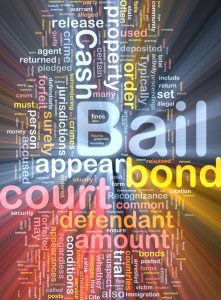
Here are some of the commonly used terms you might find helpful:
Bail: The dollar amount set by the court to ensure that the defendant makes all scheduled court appearances.
Bail Bond: An agreement signed by the defendant, stating that the defendant promises to make all scheduled court appearances. You may pay the entire bail amount yourself, or if you cannot afford to do so, you can work with a bail bondsman and pay only a percentage of the total bail. Sometimes called an “appearance bond.”
Bail Conditions: These are terms the court sets to further ensure a defendant’s appearance at designated court dates. For example, the court might require that you surrender your passport, that you have steady employment, or that you have other commitments in the community that would assure your appearance.
Bail Bondsman: An agent assigned to guarantee a defendant’s appearance at all scheduled court dates. Also called a “surety agent.” Working with a reputable bail bondsman can make a big difference in how smoothly and quickly the process goes. An experienced bail bonds company like Bond James Bond, Inc., can help get you or a loved out of custody and back home where it is easier to deal with your situation.
Bench Warrant: A court directive ordering the arrest of an individual. Often used to secure the arrest of a defendant who has failed to make designated court appearances.
Bond Premium: The portion of the total bail amount that the defendant must pay to secure a bond through a bail bondsman. For example, if the total bail amount is $1,000, and the bond premium is 10%, the fee you’d have to pay is $100. This is a non-refundable fee that goes to the bondsman to cover expenses and operations, including reminding you of scheduled court appearances.
Collateral: Non-cash assets (such as a car, jewelry, or property) that the defendant agrees to forfeit if they fail to meet scheduled court dates. A friend or relative of the defendant can also agree to put up an item such as a car to secure the defendant’s release. If as a defendant, you fail to meet your obligations, that item becomes forfeit to the court.
Defendant: A person accused of a crime.
Exoneration: Removal of responsibility—often indicating that all the obligations to the state have been met or that a defendant has been cleared of a crime.
Forfeiture: A defendant’s failure to appear at a designated court date can cause the court to demand the full bail amount from the bail bondsman. If collateral (such as a car) was offered instead of cash, the court may ask that the item be surrendered.
Indemnitor: A consignee on the bond who ensures the defendant will appear for trial. The Indemnitor will be held accountable for the full bail amount, as well as and legal expenses of the trial if the defendant fails to make scheduled court dates. Also called “co-signor.”
Pretrial Detention: Holding a defendant in jail until their trial date. This can occur if a defendant is denied bail or if the defendant is unable to produce cash or collateral sufficient to secure a bond through a bondsman.
Skip: To intentionally fail to make court appearances, often by leaving the area to avoid re-arrest.
We hope this brief glossary helps you better understand the bail bonds system and makes your encounter with it less stressful. Should you ever find you or a family member in need of a bail bondsman, please call Bond James Bond, Inc. We have 11 locations that are open 24 hours a day, 7 days a week to serve you quickly.
________________________________________________________________
Bond, James Bond, Inc. can handle any size or type of Georgia bail bonds in Barrow County, Bartow County, Cherokee County, Clarke County, Cobb County, Floyd County, Gordon County, Gwinnett County, Paulding County and Polk County. We are always open - 24 hours a day, 7 days a week including holidays. We have 11 locations which are conveniently located to serve you better. Visit us at www.bondjamesbondinc.com, or call Bond, James Bond, Inc. at (770) 382-9111.

